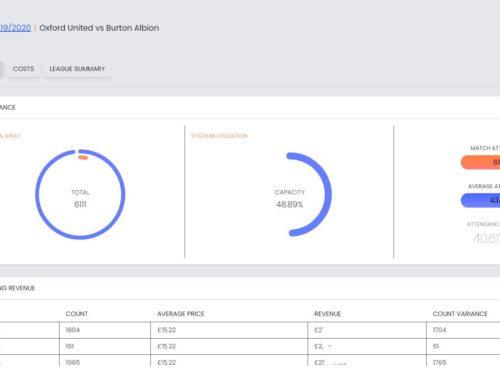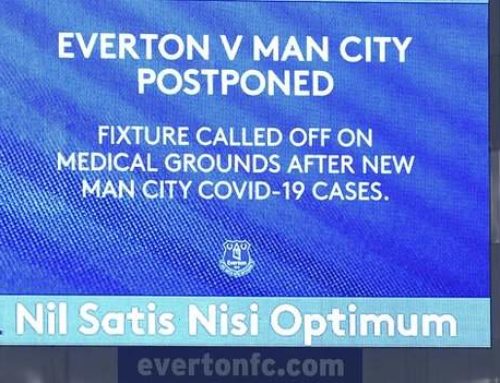BLOG | BY CHIEF EXECUTIVE MATT EVERETT
“An analysis of the nature and diversity of the financial crisis facing lower league English football clubs”.
No, not the title of this blog, actually the title of my dissertation submitted in 2005 at Loughborough University – “A research project submitted in partial fulfilment of the requirements for the degree of Bachelor of Science in Sport and Leisure Management”.
That’s how long football finance has been a passion of mine. By that point fifteen years ago I was already sure that I wanted a career in football. It had shaped my work experience at GCSE, my choices at A Level and my decision to study towards it at University.
Unfortunately I wasn’t graced with a wand of a right foot, searing pace, or even the ability to run around for 90 minutes very well – so it was always destined to be in the non playing side of the game!
Fifteen seasons later, and I have been lucky to see all sides of the game, working both for clubs at all levels, and at an agency serving many clubs across Europe. It didn’t matter what the role, one thing always seemed to dominate – finance.
“Football clubs are often in considerable financial trouble. They continue to operate through this plight, but with the situation worsening, it may not be long before we see the first professional football league club to drop out of the league through financial reasons since Accrington Stanley suffered that fate in 1963”.
No, “this plight” was not referring to the current Covid-19 pandemic, but the collapse of ITV Digital in the reasonably early years since the breakaway of the Premier League, and the introduction of transfer windows below the top flight which I was writing about in 2005.
Of course it has (perhaps miraculously) taken quite a period of time for that to happen to a club, but the loss of Bury FC from the EFL, and close shave of Bolton Wanderers going the same way last year show that the prediction was correct.
Upon reading the dissertation again, there were four case study clubs. Three were facing major financial issues at the time, and all of them were playing non-league football within a few years of the study. Two of them remain in non-league to this day. One was a positive light, showing a club appearing to be progressing in a sustainable way – and they were playing Premier League football just a few years later.
Prophetic? Maybe. But it shows that the repercussions of chasing the dream were well and truly apparent then as they remain today.
Throughout my career, I’ve noticed first hand how differently clubs operate, and are funded. I don’t envy the position of many owners, financially keeping clubs on life support often with inherited financial mismanagement and often facing the wrath of fans for failing to further invest.
It also struck me how little help there was through formalised systems, benchmarks and collaboration. I’ve seen clubs with outstanding reporting and financial management, centralised and consistent and detailed forecasting to see what lies ahead. Even in these cases though, there is not much data science behind the forecasting, and certainly no centralised system to present the information key stakeholders need access to every day in a clear and consistent manner.
It is against this backdrop that ClubView was founded. Our vision really is to bring all of that to football, and more. We want to help the industry to be more sustainable, and we want clubs to have the tools that will help them to get there.
What if big data can be collated across every club and league, to use data science and artificial intelligence to forecast exactly what affect on pitch performance and other factors will have on your future revenues and spend? From what we have already seen in our early data models, it absolutely can.
Then there’s the platform sitting behind that, presenting that data, allowing like for like comparison, and providing whole Leagues with a centralised governing and reporting tool that not only helps their member clubs, but gives day by day actionable insights to safeguard financially across the entire league. See a club who’s forecast suggests they may be struggling? Help them there and than, rather than face retrospective sporting punishment, or worse, further down the line. Give owners and senior management visibility of how they are managing their club vs others. All whilst of course maintaining sporting integrity.
It took fifteen years for me to have the opportunity to realise this passion, but the ClubView concept and product offers something unique, to help the entire industry. One of my concluding points in the dissertation was
“Research in the future could be expanded to study financial problems across the board, right up to the top levels of football, enabling better comparisons between clubs.”
Now, finally, I can play my part in providing that.
All of this was already at a very advanced stage as we entered Q2 this year. We’d already been working with a pilot club, demonstrated a working product, built an AI model that was correctly predicting attendance size, and secured lead investment.
Then Covid-19 hit. Like everyone, it’s meant a lot of adaptation. Instead of tickets, we will look at streaming for example. There may be new financial regulations coming in, and there is certainly an appetite for change now more than ever. If it does, ClubView is the tool that will help Leagues to govern and clubs to manage sustainably long into the future.
“Reset” has been a word we have heard several times since the pandemic broke. I always felt it would be required eventually, even as far back as 2005, but the current global situation has certainly accelerated that.
But ClubView was born before that. Our vision remains unchanged from when we were incorporated in 2019. We may have to adapt because of the pandemic, but we haven’t arrived here because of it. In many ways I have had the vision in my head since 2005.
ClubView continues to develop, using specific input from within football, building a tool to help football. As a team, we look forward to working collaboratively from within the game to make sure that every club has the best chance of thriving moving forwards, whatever the future holds.
Matt Everett
matt@clubview.io





